It seems kind of intuitive to us all that risky play comes with lots of benefits. When we see children climbing trees, rolling down hills, jumping off logs, and just generally having good physical fun, it just seems clear that good things are happening.
But what are the main benefits of risky play? The benefits of risky play include:
- Chance to succeed or fail
- Teamwork
- Recognize areas for improvement
- Coping with stress
- Without risky play you could become risk averse, or become adrenalin junky
- Form positive attitudes
- Social interaction
- Improve creativity
- Understanding of the environment
- Communication
- Talking about experiences
- Motor skills
- Health
- Fun
- Mental health
- Decision making
- Learn about mortality
- Resilience
- Experiencing fear
- Preparation for life
- Experience exhilaration
In this article I am going to take each of these benefits in turn, and just quickly go into the thinking behind it. If you want to find out a bit more about what risky play is first, then I would read my article about 25 examples of what risky play looks like in real life.
I will try to make it clear what the benefits in this article look like in reality as well. So here we go…
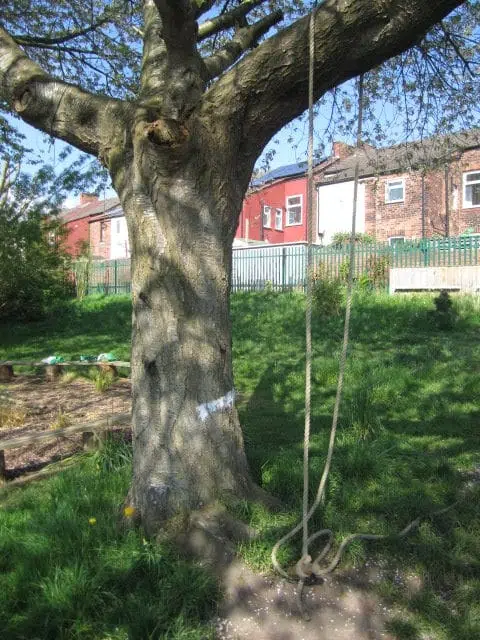
1.A Chance To Succeed Or Fail
This is a really big one.
Winning and losing is realistically a big thing in life.
Perhaps it is not so natural to think of risky play in this way. There is not any obvious competition. There are not often games with rules, where winning and losing feature.
However, there is definitely success that can be found in doing activities that end well, as opposed to a level of temporary failure if things don’t go to plan.
For example, children try to climb up a felled log. If you get to the end and jump off then great! That is success, and you really feel what winning is. However, slip off and that could be quite painful. Also, you might not be able to get to the end and get stuck.
In activities like this, children become aware of the pitfalls. They work through them, and learn to overcome failure, and the fear of failure.
They also learn to feel the exhilaration of success.
2. Teamwork
This is another massive one.
When you engage in risky play, sometimes the enterprise will often only work well if you work together.
For example, if you have a rope over a branch of a tree. One child is on the swing at one end of the rope, ready to be lifted. The others are going to pull the child up. This whole process will only work if everyone works to a defined end goal.
You learn to respect others. You know that if you mess up your role, you could hurt others. If you drop the rope and run off, the others could fall over, or the rope get pulled out of their hands. Vice versa, if they get things wrong then they could hurt you.
If you are looking for other teamwork games, then I would try these 21 circle time games for preschool that actually work!
3. Recognize Areas For Improvement
Risky play brings home the reality of life to us. Children see what they can do and can’t do. It is obvious!
They start to know what they can climb, and what they can’t.
They start to know how steep a slope they can run down.
They know how fast they can go on a scooter.
The barrier to what they can do is the next step. They start to understand that they are learning, and that there are things they will be able to do in the future when they have more skills.
4.Coping With Stress
Stress is a huge part of modern life, and children are becoming more stressed all the time.
Risky play can be stressful. For example, if you try to climb up a muddy bank, there is the risk of falling, the fear of injury.
By overcoming manageable challenges, children get to experience this temporary fear and stress, but find that they have ways of overcoming it.
Sometimes you might find you can’t overcome an obstacle in risky play. The tree might be too hard to climb, for example. You start to learn that this is OK, and some things you can do and some you can’t.
There are many other resources and styles of play you can use in the early years, such as using playdough. Find out the many emotional benefits here.
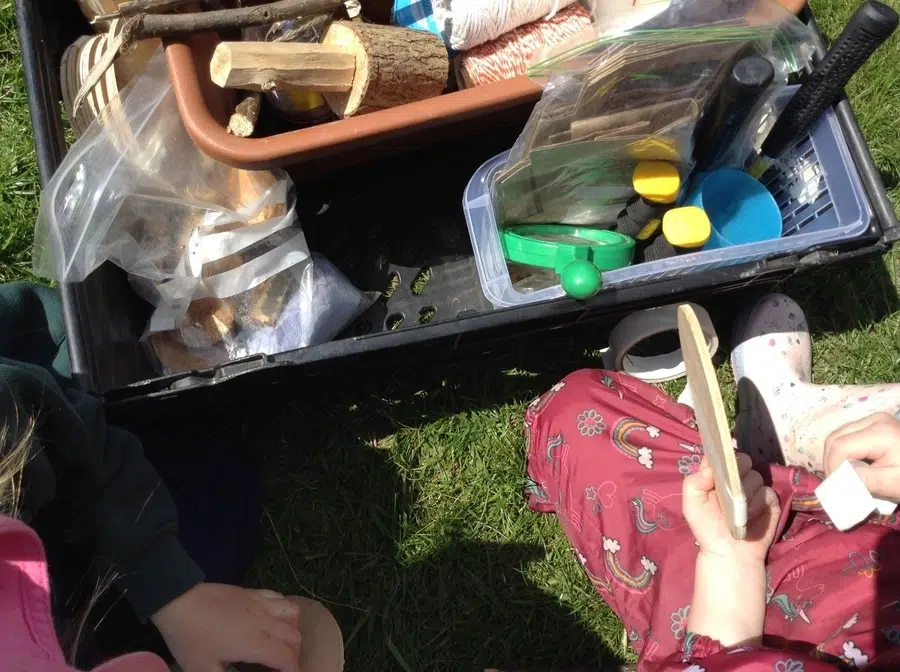
5.Developing A Balanced Approach To Risk
Risk is a feature of living, and all of us need to develop strategies to approach it.
If you experience risk in fun play environments, then you have a much higher chance of developing a ‘normal’ attitude to risk. It is not something that you seek out continually. It is just a part of life, that sometimes crops up, and needs to be reacted to.
Researchers have suggested that a childhood without a good level of risky play can have the opposite effect. Don’t get enough, and you could one of two ways:
- Become risk averse – You simply don’t like risk, and don’t want to get involved. It all seems far too stressful and scary
- You become a kind of adrenalin junky – You haven’t quite normalised the experience of risk, and it becomes a kind of be all and end all! Anything involving high-intensity, adrenalin-fuelled activity becomes a central focus of your life.
6.Form Positive Attitudes
Risky play is a great way of generating a positive inner voice in children’s minds.
Because there is no definite outcome that they need to try to and achieve, they do not think in an ‘I can’t’ way.
No one will force you to climb up a stack of tyres or roll down a muddy slope. If you choose to do so, then great. You try things out, and some things will go better than others. You start to see that you can do the things you choose.
You will see a great sense of achievement when children carry out risky play ideas successfully. For example, whittling a stick with a knife. There is a great sense of pride using these grown-up tools.
7.Social Interaction
Risky play is a really social experience. Most children engage in risky play as a joint venture with others.
There is always that element of daring that is heightened when in a group. No dare-devil would probably attempt what they do if there is no-one there to see it.
Children encourage each other to go down slopes on bikes and scooters.
They try rope-swings and slides together.
They watch what others do, and if it goes well they are given confidence to have a go themselves.
If you are looking for other ways of developing social interaction, then take a look at the 40 greatest parachute games for kids.
8.Improve Creativity
With risk comes problems.
Problem solving is one of the best ways of getting children thinking.
Often indoor problem solving can be a bit half-hearted. Children are not always massively interested about finding answers to word-problems, or maths provocations.
It is very different outside. If you are trying to cross a muddy bog by making a path from sticks and logs and stones, then you will find the children are fully involved. They are in the zone! Errors will have big consequences. You will get stuck in the mud.
Loose parts play outdoors may sometimes come with some levels of risk. Read the ultimate guide to outside loose parts play here.
Risky problems are much more powerful, and get children using all of their attention.
9.Understanding The Environment
Risky play is often (though not always) outdoor based. (It can also be indoors based as you can find out here.)
In engaging in risky outdoor play, children develop a much a deeper and concrete understanding of the environment.
They learn the effect of rain – making the ground muddier, the logs slippier.
By exploring the terrain, they see how plants grow, and what else lives there.
Children really enjoy risky hiding games, like hide and seek, and the temporary thrill of begin out of sight. They explore unknown environments with new eyes, with an added sense of danger.
10.Communication
Communication is a necessity when getting involved in risky play.
Talk is not aimless or just a time-killer.
Children are asking questions that they need to know the answer to, like ‘Is it OK to stand here.’
They give advice and give their thoughts. They are learning to look out for others, and also it is important for a kind of survival instinct.
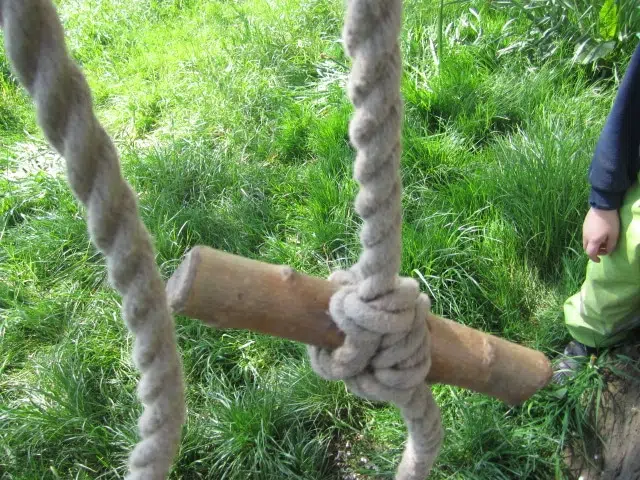
11.Talking About Experiences
Risky play gives children exhilarating experiences to which they give their full focus. This leads to all sorts of talk.
Children will talk things through as they go along. It becomes important to think aloud when balancing on logs, or using dangerous tools like bow saws.
They will often also be super keen to tell others about their experiences afterwards. They can’t wait to relate their experiences to others at home or in school or nursery.
This helps children to make sense of their lives. They begin to understand what the past is, and what has happened there.
12.Decision Making
Outdoor play calls for decisions.
Which is the safest path up the hill?
How high should you go up the tree?
How far away from the others should you go?
How can you get across the huge puddle?
The environment will call for action, and this requires you to think what to do.
Sometimes it will be a group decision, and this involved negotiating and sharing ideas. What would be the best way of building a den?
Sometimes it will just be your own decision, and you have to think about how to best achieve you goal.
All these decisions will have consequences. Often children will try something that doesn’t work very well. That is great though, and gets them thinking and learning. They may try it differently the next time.
13.Motor Skills
This is a kind of obvious one: children develop physical skills and abilities continuously whilst engaging in risky play.
They develop strength in their upper bodies and limbs by climbing, using tools, running, riding bikes and things like that.
They improve balance by walking across logs and rocks, and stepping stones.
They improve coordination by using tools, building with objects, or holding food on a stick in a fire.
They can pull ropes, lift heavy objects, and do all manner of things that helps their hand strength.
14.Health
Risky play can be hugely beneficial to mental and physical health.
Children will run a huge distance when involved in risky play. They are using their whole bodies as well as their minds.
They learn to move in different ways, crouching, climbing, foraging. It can also give them a love of outdoors, and convert into an outdoor lifestyle in the future.
15.Fun
That often forgotten three letter word that surely should underpin all education – fun!
Risky play can be cold and wet and painful, but the majority of the time those things are over-ridden by a sense of fun.
Fun is a great way of developing resilience. It also suggests total involvement in activities. Games like risky superhero play outside are brilliant for bringing excitement to young children.
16.Mental Health
Mental health is another growing problem in modern education. More and more children are suffering from anxiety, depression, anger, and all sorts of mental issues that underpin their whole experiences.
Risky play is definitely not a magic wand, but it can definitely help children who experience these negative mental states. I have spoken to several teachers about how children with challenging behaviour often thrive in risky play contexts.
The ‘rules’ of risky play are very different to conventional rules of behaviour. In an indoor context the rules that we create are more abstract to children, and often further away from their goals. Using quiet voices, not engaging in rough and tumble, or not running are a few examples. They are guidelines set up for a more adult agenda.
The rules of outdoor risky play are very different. They are there to be experienced. If you try to climb up a tree that is too difficult for you, then you will fall off and hurt yourself. If you put your hand in the fire, you will be badly burnt.
It is much more black and white.
Most children seem to have an innate understanding and respect for this.
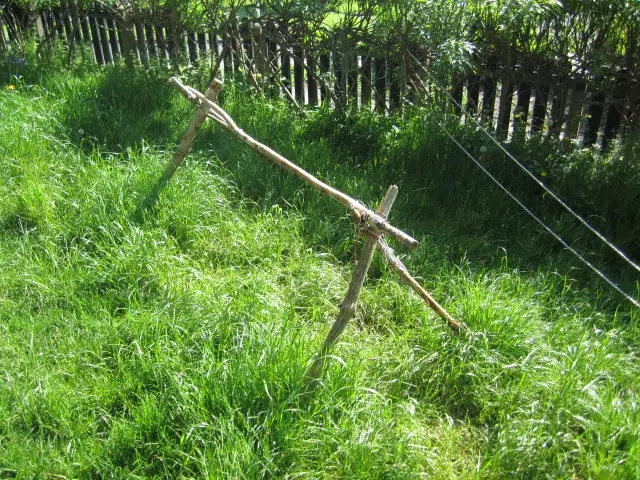
17.Learn About Mortality
This is a bit of a grim one, and something not often connected with childhood.
But in experiencing danger, children will start to understand that none of us are here for ever. If you jumped into the fire you would be burned and die.
If, for example, a child goes to the top of a tall building, they start to understand that if you fell off you would also die. That know this, and they start to feel it to. The thought is wrapped up with fear.
It is the same using dangerous tools. If you sawed yourself, it would have terrible consequences.
It is learning to respect your life, and that there are dangers out there that need to be respected also.
18.Resilience
Risky play can be a bit painful. It is full of scrapes, bruises, and cold feet.
Also things will go wrong, sometimes a lot of things.
This is all a fantastic recipe for developing resilience. We all need a balance of success and failure. It is what keeps us learning, and developing a positive attitude.
Children will learn that if you slip of the log the first time, you can get back on a try again. If you fall off the stack of pallets, you can try to climb them again.
This learning to keep going is crucial.
19.Experiencing Fear
We often don’t like to think of children experiencing fear, but it is a necessary part of life.
Fear is there for a reason. Fear is a reaction to a threat that could do great damage to us.
Children need to experience this. They need to both know and feel that if you use the tools in the wrong way, or jump into a lake, then that will cause huge damage to yourself. Fear helps the thinking process.
Also, to an extent fear is there to be overcome. One of the biggest barriers to success in life is fear – fear of public speaking, interviews, or failure.
To experience a level of fear about something, like going down a slop on a scooter, and then to do it is a great achievement.
20.Preparation For Life
As we have seen, risky play has so many of the components of life.
You will find decision making, winning and losing, social interaction and learning about yourself.
Children start to understand themselves, and what are their strengths and abilities. They see the capabilities of others, also, and the whole process becomes a blueprint for their future lives.
21.Experience Exhilaration
There is a real thrill involved in all risky play activities.
There is the innate desire for speed, such as going on fast swings, or running down slopes.
There is the bonding experience of chase and rough and tumble play.
There is a sense of achievement against adversity in climbing.
Because all of these activities have the element of risk, to overcome that and come out the other end is very rewarding. Many children experience a kind of natural high during these times.
The Next Level
If you are passionate about developing risky play in your school or preschool, then check out our online course ‘Project Loose Parts’. This 2-hour video course contains over 100 inspirational learning provocations, many of which go alongside an element of risky play. You can find the Project Loose Parts course here.
Conclusion
All in all, the benefits of risky play are colossal.
These experiences create a blue-print for the many happenings of life. They help you deal with stress, decision making, being creative, and learning how to communicate effectively and happily with others. There are many examples of research and opinion about how important it is (Source).
Children that engage in risky play become more confident, happy, and more ‘well-rounded’. Good luck with the risky play!
This article is taken from our book ‘Loose Parts Play – A Beginner’s Guide’. You can check it out on Amazon here.
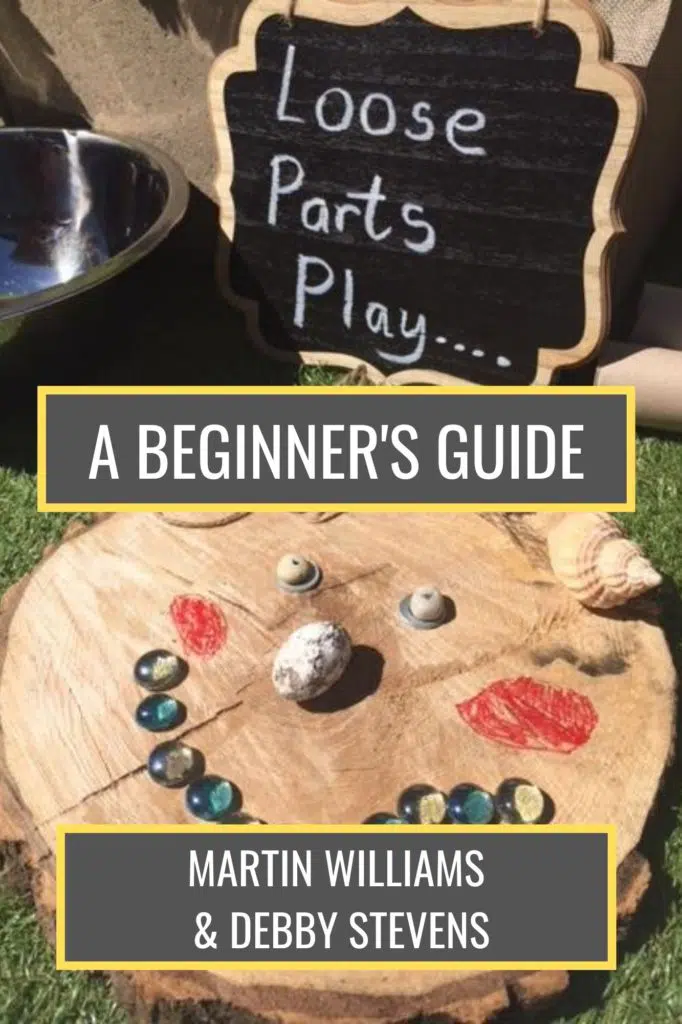
If you’ve enjoyed this article, then you might find the following useful:
